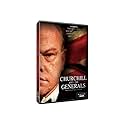A complicada relação entre Winston Churchill e os líderes do exército britânico durante a Segunda Guerra Mundial.A complicada relação entre Winston Churchill e os líderes do exército britânico durante a Segunda Guerra Mundial.A complicada relação entre Winston Churchill e os líderes do exército britânico durante a Segunda Guerra Mundial.
- Direção
- Roteirista
- Artistas
- Indicado para 5 prêmios BAFTA
- 1 vitória e 5 indicações no total
Fotos
Enredo
Você sabia?
- ConexõesFeatured in The Falklands Play Row (2002)
Avaliação em destaque
Winston Churchill who rallied his nation and may very well have saved civilization by keeping the UK fighting against Nazism until the Soviet Union and the USA entered the war, had some serious flaws as a military strategist. There was only one way of beating Hitler, go right through the front door of Western Europe. Churchill however wanted to nibble at the sides, hence the Mediterranean campaign, the attempt to take Norway back.
The fear was understandable. Everyone on both sides in Europe feared the four year stalemate that was World War I with the trench warfare in France. Anything to avoid that again, so the British shied away from a cross channel invasion and a campaign in France.
Timothy West captures the mercurial part of Churchill's nature as well as the inspiring one. In his long career, Churchill was both First Lord of the Admiralty and Secretary of State for War, the former post he held twice. He was educated at Sandhurst though he left the army for politics, he fancied himself a military strategist.
This made for TV docudrama shows a Churchill who hired and fired generals in much the same manner that Abraham Lincoln did in the Civil War. But Lincoln was more result oriented, the Churchill we see here is someone who got rid of people basically because they didn't kiss up to him.
He got rid of generals like Wavell who defeated the Italians at Addis Ababa and Auchinleck who slowed the Nazi advance at the first battle of El Alamein for pretty much that reason. The man who replaced Auchinleck in North Africa, Bernard Montgomery took Auchinleck's battle plan and turned the Nazis at the second El Alamein.
After that, the direction of war planning came more and more from the American military. In fact one of the reasons I like Churchill and the Generals is it shows just how much different things were with FDR and his generals and Churchill and his. Roosevelt was smart enough to know when he was not in his element and he left strategic planning to George C. Marshall and Ernest J. King in the Navy. Next to West as Churchill, I liked Joseph Cotten as Marshall.
A great inspirational leader, but one who his generals wished had just confined himself to making speeches in Parliament.
The fear was understandable. Everyone on both sides in Europe feared the four year stalemate that was World War I with the trench warfare in France. Anything to avoid that again, so the British shied away from a cross channel invasion and a campaign in France.
Timothy West captures the mercurial part of Churchill's nature as well as the inspiring one. In his long career, Churchill was both First Lord of the Admiralty and Secretary of State for War, the former post he held twice. He was educated at Sandhurst though he left the army for politics, he fancied himself a military strategist.
This made for TV docudrama shows a Churchill who hired and fired generals in much the same manner that Abraham Lincoln did in the Civil War. But Lincoln was more result oriented, the Churchill we see here is someone who got rid of people basically because they didn't kiss up to him.
He got rid of generals like Wavell who defeated the Italians at Addis Ababa and Auchinleck who slowed the Nazi advance at the first battle of El Alamein for pretty much that reason. The man who replaced Auchinleck in North Africa, Bernard Montgomery took Auchinleck's battle plan and turned the Nazis at the second El Alamein.
After that, the direction of war planning came more and more from the American military. In fact one of the reasons I like Churchill and the Generals is it shows just how much different things were with FDR and his generals and Churchill and his. Roosevelt was smart enough to know when he was not in his element and he left strategic planning to George C. Marshall and Ernest J. King in the Navy. Next to West as Churchill, I liked Joseph Cotten as Marshall.
A great inspirational leader, but one who his generals wished had just confined himself to making speeches in Parliament.
- bkoganbing
- 9 de fev. de 2007
- Link permanente
Principais escolhas
Faça login para avaliar e ver a lista de recomendações personalizadas
Detalhes
Contribua para esta página
Sugerir uma alteração ou adicionar conteúdo ausente

Principal brecha
What is the Spanish language plot outline for Churchill and the Generals (1979)?
Responda



















